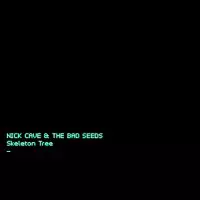There are no swear words on Skeleton Tree, the sixteenth studio album from Nick Cave and the Bad Seeds, but it feels like it should still come with a warning label: “Parental Advisory: Devastatingly Sadâ€.
Listening to this downbeat, disquieting record, it’s impossible to divorce these songs from the tragic circumstances surrounding their birth. Cave’s teenage son Arthur fell to his death in July last year, and while most of the songs were written and partially recorded before then, Cave did revisit and amend various lyrics afterwards. Unsurprisingly, sadness pours out of the record’s every groove.
There are almost no guitars here. That’s not exactly new for the Bad Seeds, who have spent much of the last 20 years allowing Cave’s piano to take centre stage. But it too is relegated to the background here, in favour of synthesisers, loops, drum machines, vibraphones and drones. Is it an ambient album? Is it electronica? Such categorisations don’t really matter. But in the Bad Seeds’ post-Blixa Bargeld, post-Mick Harvey era, it becomes clearer with every release that, Cave aside, bearded madman and multi-instrumentalist Warren Ellis is the band’s primary creative force. Skeleton Tree has more in common with Cave and Ellis’s film soundtrack work than it does with any other Bad Seeds album apart from 2013’s Push The Sky Away, to which it feels like a natural successor.
Comparisons are hard to draw, but it’s perhaps slightly reminiscent of Johnny Cash’s final American recordings – the stripped down arrangements, the focus on mortality, the occasionally cracked vocals – only with an additional layer of ambient texture and an almost complete abandonment of traditional song structure. Verse-chorus-verse wasn’t going to cut it under the circumstances. Maybe there’s a hint of latter day Tom Waits in the unconventional instrumentation, but it’s more sparse soundscapes than clanking noise. It’s dark, desolate, and occasionally oppressive.
The minimalist arrangements provide ample room for Cave’s words, and lyrically the record is as bleak as you might expect. It focuses on themes of death, loss and grief, with Cave sounding by turn numbed, bewildered and utterly heartbroken. “I used to think that when you died you kind of wandered the world… I don’t think that anymore†he sings on “Girl in Amberâ€. The same song ends with Cave almost moaning “don’t touch meâ€, and you can well picture him physically recoiling from a friend or lover trying to offer comfort.
“Distant Sky†– elevated by Danish soprano Else Torp’s genuinely beautiful vocals – is suitably devastating, as Cave sings “They told us our gods would outlive us / They told us our dreams would outlive us / But they liedâ€. It’s hard not to subconsciously replace the word “gods†or “dreams†with “childrenâ€. The closing title track ends with Cave repeating the words “And it’s alright now†as if trying and failing to convince himself of their truth.
Cave’s vocals are excellent throughout – sometimes cracked, occasionally mumbled, never less than effective. For the most part he speaks his words like dark invocations, which makes it all the more affecting when he actually sings, like when his voice quavers in “I Need Youâ€.
At just under 40 minutes long Skeleton Tree is the shortest Bad Seeds record ever, which is probably no bad thing. Grief weighs heavily on the album, and another 10 or 20 minutes might have sunk it.
A friend of mine and fellow Nick Cave fanatic told me last week that to offset the misery of this record, he was interspersing it with listens to Rivers Cuomo’s relentlessly upbeat Japanese album. I get where he’s coming from. It reminds me of watching the original Blair Witch Project for the first time, alone in the dark, and then immediately feeling compelled to watch the most cheerful film I could think of, which turned out to be Caddyshack.
That’s an unnecessarily longwinded way of saying that Skeleton Tree won’t be for everybody – it’s heartrending listening to a man grieve so explicitly. If you’re new to Nick Cave, don’t start here. If you’re an occasional Cave fan, you still might want to tread carefully. You won’t find the rich characters and grisly narratives of Henry’s Dream and Murder Ballads here, or the tender piano ballads of The Boatman’s Call and No More Shall We Part. It’s a world away, too, from the scuzzy garage rock of Dig, Lazarus, Dig or the gospel choirs of Abattoir Blues. But there’s an undeniable beauty in these songs. Musically daring, lyrically desolate, emotionally raw – Skeleton Tree is a tough listen, but it’s well worth the effort.
